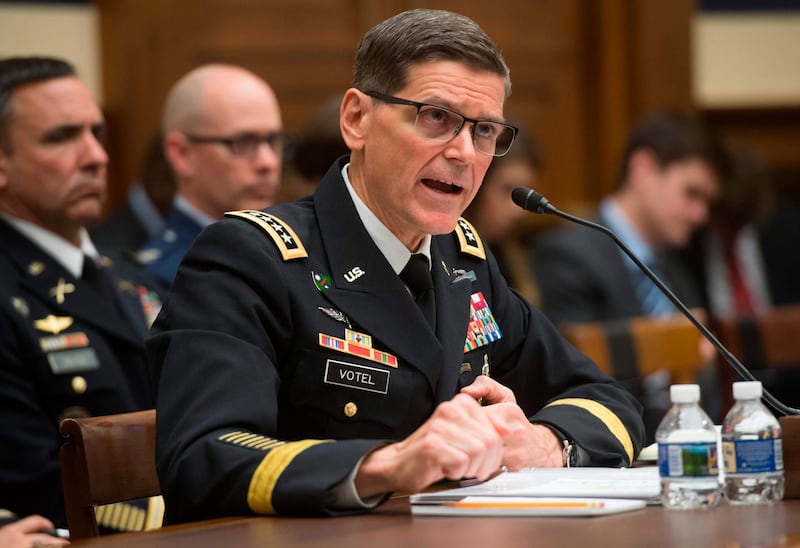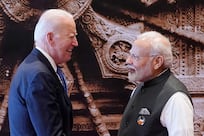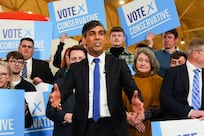Since the forces of ISIL captured Mosul in 2014 and declared a so-called caliphate, the United States has had a laser-like focus on defeating Salafi extremists in Iraq and Syria. All means were good to this end, even co-operating with Shia militias beholden to Iran in the fight to reconquer Mosul.
Now that this goal is all but achieved, Washington’s attention is shifting towards Iran and in particular the gains it has made during the battle against ISIL – a strengthened position in Syria, support for the Houthis in Yemen and a growing ballistic missile arsenal.
Speaking in Washington on Tuesday, General Joseph Votel, commander of US Central Command which covers the Middle East, said Iran had "extended its tentacles across the region through numerous proxies". On Yemen, he said: "What it took 20 years for Iran to do in Lebanon with the Lebanese Hezbollah, they're attempting to do in about five years with the Houthis."
His comments build on remarks made earlier by the US National Security Adviser, General HR McMaster, who said: “The time is now, we think, to act against Iran.”
But what did Gen McMaster mean by this ominous threat? The goal is clear but the roadmap is not so easy to figure out.
Gen Votel, in his testimony to the house armed services committee, was evasive on the role of the US military in countering Iran. He said this was not a military objective in Syria but he acknowledged it was a “broad US objective”.
This lack of clarity might be put down to the confusion which surrounds some aspects of foreign policymaking in the White House, where the president’s advisers often do not share his world view. But that is not the case with Iran. The military men around the president are, by experience, deeply sceptical of Iran and share his strategic goal.
In the words of Bruce Jones, a foreign policy expert at the Brookings Institution in Washington, this is an “overarching strategy of containing, pushing and eventually fighting with Iran”.
One result of this shared strategy is that Donald Trump's campaign promise to end Middle Eastern entanglements has been ditched in favour of a commitment to stay in Syria to counter Iran, or specifically what Rex Tillerson, US Secretary of State, has called its "dreams of a northern arch" to Lebanon. This is likely to lead to a creeping escalation of the US security presence in the region.
But the tactics towards Iran are a different matter. The president and his team do not agree on the issue of the moment, the future of the 2015 Iran nuclear deal which Mr Trump inherited from Barack Obama.
A second issue is that Russia is using its veto power at the UN Security Council to protect Iran. It vetoed a resolution which condemned Iran for supplying missiles to the Houthis and called for action against Tehran for breaching the arms embargo. The resolution was strongly supported by Lana Nusseibeh, UAE Permanent Representative to the UN, as a way to stop further proliferation of missile technology around the region to Iran's clients.
Whatever the reason for the veto, it presents the US with a complicated diplomatic and military framework in which to set about containing Iranian expansion.
Mr Trump’s immediate concern is how to follow through on his promise to withdraw from the Iran nuclear agreement, known as the JCPOA or Joint Comprehensive Plan of Action, which he has called “the worst deal ever”. His advisers do not think it perfect but it is worth preserving because nothing better is available. It offers Iran relief from sanctions in exchange for limiting aspects of its nuclear programme for 10 or 15 years and a promise never to develop or acquire nuclear weapons.
Mr Trump has set the clock ticking over the JCPOA, demanding an end to these “sunset clauses” and the addition of limits on Iranian ballistic missile development, which is not part of the deal. He has delivered an ultimatum to the European powers which helped to negotiate the nuclear deal – Britain, France and Germany – to “fix the terrible flaws” in it. If they fail, in May he will stop issuing the regular waivers on US sanctions. This will lead to the re-imposition of US sanctions on Iran.
These are deep diplomatic waters. The Iranians have been following to the letter the terms of the nuclear deal, as regularly attested by inspectors of the International Atomic Energy Agency.
For the moment, the Europeans are wrestling with Mr Trump’s demand that they commit to continuing to restrain any nuclear weapons development by Iran after the “sunset clauses” take effect. The idea is that Mr Trump could be presented with an extension of the deal outside its terms. Such a diplomatic manoeuvre is legally possible but it is not clear if that would be enough to satisfy Mr Trump.
For all the weaknesses of the nuclear deal, there are strong diplomatic reasons for the US not to withdraw from it: it would set a precedent for a US president to go back on the signature of the previous administration, which would surely be used by North Korea as a justification for maintaining a nuclear arsenal. It would also undermine the current basis for controlling the spread of nuclear weapons by showing that Washington does not trust the UN and its agencies to enforce it.
The regime of international sanctions against Iran – apart from those imposed by the US – would be impossible to enforce. There would be a free-for-all, to the advantage of Iran.
Iran has hinted that it would pull out of the deal if the US undermines it. But these hints may be grandstanding. If the Americans pull out, Tehran thinks it could cause more damage to US prestige and power by staying in the JCPOA with Russia, China and perhaps the Europeans.
There is indeed an urgent need to contain Iranian expansion, but the call to action by Gen McMaster hides the fact that the US is still searching for a way to achieve this. It will no doubt be an effort which will be much longer than it took to root out ISIL.





